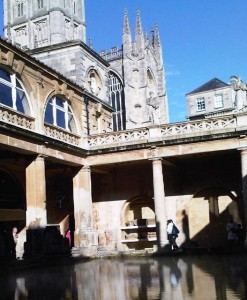Twitter is already a serious alternative to the conventional news media. You can’t say much in 140 characters, and you can impart important information very quickly, and also guide people to further reading.
This is a simple example of the former. Say I arrive at Euston station and find a big throng of people on the concourse, all staring up at the train information boards. Nobody is going anywhere.
All the boards tell you is that trains are delayed. On Twitter on my mobile phone I search “London Midland” (the train company I use) or “Euston” or “ Virgin” and within seconds the Cloud is telling me what’s wrong.
It’s very easy to pin down the problem and precisely where it is, from the accumulation of tweets, either from @LondonMidland themselves, or people who are on delayed trains. This invariably beats the station announcer’s often intermittent messages, and is on your phone within seconds. @LondonMidland is particularly helpful. There is an unnamed person, or persons, issuing information about train delays all day long, and politely responding to passengers who include the address in their message.
Once, stuck on a stationary train, I issued an appeal through a tweet to anyone in the Harrow area – where I knew the problem was – to ask if the trains were moving yet. A perfect stranger responded to say they had just started to move, which meant that trains stuck behind would be on their way soon. We knew this sooner than the guard on our train.
Earlier this summer the leader of Buckinghamshire county council told councillors that for his generation, “tweets are for blackbirds”. To be fair to that council, some departments actively use the medium: for example, for road gritting in the winter. The Council tweets to say when their vehicles are gritting, and direct you to a website showing, through GPS, precisely where they are.
This week (September, 2011) 29 Scottish Councils combined for a 24-hour tweet project to inform citizens. My local council, for example, issued an invitation to people to help plant wild flowers.
I looked at how various city and regional tourist boards in the UK are using Twitter. It varies quite a lot. Most tourist departments use the medium and issue regular updates on things happening, and new attractions and interact with the Twittersphere. I found Oxford and Bath particularly good at this, and there are others. But there were a few, too, who are not regular, and can go days or even weeks without tweeting.
How useful could Twitter be to tourists? The Guardian has published a number of articles by journalists who went to destinations, such as Birmingham and Manchester, and asked local people to suggest what they should do and see, using a specific keyword and hash tag.
And this summer (2011) @VisitBath, the official tourism website for Bath, invited journalists to visit the city and solicit similar advice during a day’s sightseeing. @VisitBath have published a digest of what people suggested. I visited Bath almost a year ago. The main sites, such as the Roman Baths, and the Crescent, select themselves, and you hardly need the Bath Twitterati to point them out.
But the Twitter tour wins when it points to places such as cafes, that the innocent outsider could easily miss, unless he or she spends quite a few days in town, indulging in a lot of trial and error, and potentially spending a lot of money. If enough people are suggesting a previously unknown place, and one which is perhaps too recent for the guidebooks, then perhaps it’s worth a visit. It’s the same with restaurants. Guidebooks are helpful, but can be out of date. What if the star chef has moved on since the last edition? You wouldn’t know. But if somebody who once there the night before is advising, that could count for something. Two big advantages Twitter has are immediacy, and insider knowledge.
We are only at at the beginning of the Twitter revolution (or whatever revolution will replace it over the next three or four years) and there are still big empty spaces. Many people, and they include travel professionals, use Twitter only fitfully or not at all. (I recently spoke to a PR who told me certain of her North American clients asked for promotion through social media all the time, whereas another client, a well-known UK name, didn’t think it at all appropriate for their market and didn’t want it used in promotion.)
I have tried Twitter tourism, tentatively asking for information in certain cities but receiving no tweets at all in response. But then I don’t have many followers. I’m sure this will change. Twitter is a wonderful, almost instant way of disseminating information to potentially millions of people out there. I feel a buzz of and vitality with a perfect stranger talks to me, ideally in a positive way. (This may not be better than talking to people in person,.) But it certainly quicker.)
As conventional news media decline, and I include TV and radio news in this, Twitter, or whatever it evolves into, will grow to be ever more useful, and in ways we cannot even imagine today.
@GHDDestinations
www.directoryofdestinations.com

